| Stories :: S |
| |
|
|
Lucy Sacco
|
|
Josiah Sand
U.S. Army Air Corps
| Born: 1919 |
Residence:
San Diego, CA
United States |
Original home:
Rochester, NY
United States |
I was with the 90th Fighter Squadron, Tenth Air Force. My last job before starting the long trip home was to help in the process of getting our fighter planes up to attack the dug-in Japanese outside Myitkyina on the Irrawaddy River in northern Burma. We had provided fighter cover for the building of the Ledo Road, and when Myitkynia, the rail head, finally fell to us, through the joint efforts of what was left of Merril's Marauders and Chinese troops led by General Stillwell, we linked up with the Burma Road into China, and our job there was done.
After about twenty eight months overseas I was being rotated home for a brief furlough, expecting to be reassigned to the Pacific area and the war with Japan.
I believe the ship I was on was the General Patrick, which departed from Calcutta, went through the Suez Canal and into the Mediterranean. When we were close to the island of Pantellaria, our ship's radio announced that Hiroshima had been bombed, and we all cheered, because we knew the war was just about done. A few days later there was the bombing of Nagasaki, followed before we got to disembark at Fort Dix in New Jersey, by the surrender of Japan.
They did not waste a lot of time processing us to go home, and before I knew it I was back with my family in Rochester, NY. It was a wonderful reunion, but it was a long time before I felt like a civilian again. |
|
Dave Satre
Other (A five-year-old child during WW II. Served in the Army as an adult)
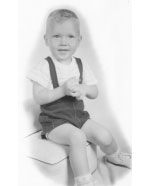 |
| Born: 1939 |
Residence:
San Jose, CA
United States |
Original home:
Madison, MN
United States |
I was just five years old on August 14th, 1945, but I remember the day quite clearly.
We lived in a small Minnesota town with around 2,000 inhabitants out on the edge of the Great Prairie and most of our rather large family was gathered in my grandparents' family room, huddled around the radio.
We were listening to Cedric Adams, a famous Minneapolis newscaster and eagerly anticipating the long-awaited announcement of the end of the war.
What I remember most of all was the joy in the room when the official announcement of Japan's surrender was made. My dad, who was a member of the National Guard and awaiting shipment overseas at the time, was also a member of the local volunteer fire department and the driver for the town's fire truck. We ran the several blocks to the firehouse and jumped into the fire truck, with me in the front seat, and drove all over town with the siren screaming with celebration.
The town was alive with joy. People were out of their houses and celebrating in the streets. We drove that firetruck all around town, on every street, I don't know how many times. And the thing I remember most vividly, and probably the reason my memories of the day are so strong, was that I was the one who got to push the button for the firetruck's siren. A truly exciting experience for a five-year-old kid.
I also vividly remember my grandmother's victory garden because she had insisted that I participate in its planting each year, as well as planting the seeds for a patch of Morning Glories by the back entrance to the house each Spring. To this day I remain an inveterate gardener, and I plant Morning Glories every year in memory of Grandma. |
|
Leonard Schlick
|
|
Edmund Schloss
U.S. Army
| Born: 1925 |
Residence:
San Diego, CA
United States |
Original home:
Chicago, IL
United States |
I was with the 3rd Armored Division in Europe. We were in combat from Normandie to Dessau, Germany where we met the Russian Army.
We penetrated the Siegfried line on Sept 13, 1944 (the first American troops in Germany). When the German army counterattacked in the Ardennes (Battle of the Bulge.) in December of 1944, we were pulled out of Germany, back to Belgium to fight the enemy.
Our last day of combat was April 24th 1945, my 20th birthday. We fought the Germans thru France, Belgium and Germany.
On August 14th V.J.day our division was on maneuvers preparing for the invasion of Japan. Needless to say, we were overjoyed that we would be going home rather than being moved to the Pacific. |
|
Tim Scott
U.S. Navy
| Born: 1925 |
Residence:
San Diego, CA
United States |
Original home:
Arcadia, NE
United States |
Written by Tim Scott on Apr 25, 1995
"29 Arpil 1995. I was aboard the USS Shangri La CV39 and we were with the 3rd Fleet steaming off the coast of Japan. We received this message via radio & it was sent up to the signal bridge for us to send to the USS Missouri which was not to far off our stbd beam. The message is from the VADM John S McCain on the Shangri La to ADM Bull Hasley. We sent it by flashing light some time during the night of 10 August 1945.
I was the Supervising Signalman on the bridge.
Tim Scott SM2/C"
The telegram read, "FOLLOWING IS DIGEST OF DOMEI NEWS BROADCAST IN ENGLISH X JAPANESE WILLING TO SURRENDER IN ACCORDANCE TERMS OF POTSDAM DECLARATION PROVIDED EMPEROR RETAINED AS SOVEREIGN RULER BT"
NOTE: Tim thought being in possesion of the telegram was seriously against military conduct.
He shared very few war stories, thank you for letting me share this one.
Marguerite
Submitted by:
Marguerite Scott
San Diego, CA - United States
Relationship to Storyteller:
Son/Daughter |
|
Stephen Segall
|
|
Kim Seixas
|
|
Edith Shain
Civilian
 |
| Edith in training to be a nurse, 1945. |
| Born: 1919 |
Residence:
Los Angeles, CA
United States |
Original home:
New York, NY
United States |
I'm a nurse working at Doctors' Hospital in Manhattan. The radio in my patient's room is playing "Tie A Yellow Ribbon on the Old Oak Tree". My patient is taking the medication I handed to him.
The music is interrupted with an announcement that Japan has surrendered and the war is over...
I'm stunned, incredulous, and joyful. Fifteen minutes later, after removing my cap, I'm running to the subway. I get on the train to Times Square.
When I get there, I run up the steps and to the street, walk a short distance.
I'm surrounded by jubilation. Soldiers, sailors, old and young civilians. I celebrate with them.
A sailor puts his arm around me, bends me back, holds me, and gives me a long kiss. I close my eyes. When he releases me, I turn in the opposite direction and walk away.
The sailor is a symbol of all who fought in the horrific savagery of the war who shared courage, responsibility, and commitment.
We at home were with you.
Now, we are all together; the combination of all of our efforts.
Now, the empty spaces will be filled.
Now, the broken pieces will be put together.
Now, relationships will be repaired.
Now, we have peace.
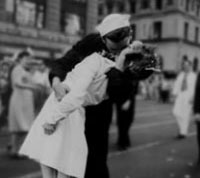 |
|
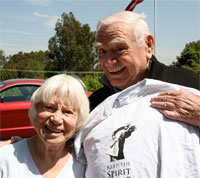 |
| The famous kiss (this view taken by U.S. Navy Photographer Victor Jorgensen). |
|
Edith today, with fellow Stories of Service spokesperson Ernest Borgnine (Academy Award winner, WWII Navy veteran) |
|
|
Sanford Shifrin
|
|
Vincent Silva
|
|
Norma Silver
|
|
Don Silvious
|
|
Bud Simmons
Civilian
| Born: 1932 |
Residence:
Santa Rosa, CA
United States |
Original home:
San Francisco, CA
United States |
August 14, 1945 was my 13th birthday and I will always remember that day. During the time of WW II my father was an Air Raid Warden in the Sunset District of San Francisco and I can remember the black outs and watching the ships go out to sea and the squadrons of airplanes leaving the bay area. My brothers and I, two of them, keep up with the events of the war as we delivered the newspapers in the Sunset, The Call Bulletin, The Chronicle, The Examiner, and the News for years. With circulation awares we were able to visit the Hunters Point Shipyards on many occasions. During that time San Francisco was an extremely patriotic town, on Market Street you would always see several members of each branch of the service. Market Street was a joyous place to be on VJ Day and one which I will never forget. We initially heard the news over the radio (no TV) and neighbors were out in the streets on the avenues. My reaction wss one of great joy and thought of how great our country is, after following the advancement of our troops in the Pacific on a daily basis through the delivery of our newspapers. Headed down to Market street and can remember of how proud I was to be an American and that has remained with me over the years.
It was just a few years later that my older brother, Ray, joined the Navy, and not long after my younger brother Jim joined the Marine Corps, and I shortly followed in the Air Force. We proudly served our country during the Korean War. Over the years I have become very active in veterans organizations, namely The American Legion, Amvets and the VFW, besides being an associate member of the MCL & VVA.
Our veterans of "The Greatest Generation" as well as the survivors of Pearl Harbor have been a great inspiration to me as well as my brothers.
I had the pleasure of meeting the Navigator of the Enola Gay,
Dutch Van Kirk as well as many survivors of Pearl Harbor and airmen of the famous "Tuskeegee Airmen" -
all of them great heroes that I will never forget.
My heart felt thanks to them and those that made the supreme sacrifice -- God Bless them and our present Armed Forces. |
|
BUD (SHELDON) SINGER
U.S. Army
| Born: 1923 |
Residence:
SAN DIEGO, CA
United States |
Original home:
CHICAGO, IL
United States |
Our anti-aircraft battalion was in Luxemburg preparing to re-assemble after
our combat duty in Europe. We were scheduled to be transported to Marseilles for assignment to the far east. Luckily, we were re-assigned to guard duty in Bad Mondorf, Luxemburg, holding the Nazi war criminals in the Palace Hotel until the facilities were prepared for their trials in Nuremberg. |
|
Alan Singleton
U.S. Navy
V J Day in 1945
By Alan Singleton
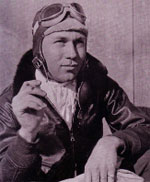 |
| Norfolk NAS, Va 1944 |
| Born: 1924 |
Residence:
San Jose, CA
United States |
Original home:
Denver, CO
United States |
Things happening around me the day WW II ended were very much influenced by what happened when Germany surrendered some four months earlier. That event caused the disbanding of the Atlantic Fleet anti-submarine squadron where I was assigned for my War up to that April day.
We were told that we were to undergo a psychological screening to determine our fitness to move into the Pacific war. At the time, my wife (carrying our first child in her third trimester) was with her parents in Vallejo, CA.
After screening, I was sent to an Advanced Training School in Norman, OK. I was diligent in my studies for the six months long series of classes in Aircraft Maintenance, and doing well. I think it was a sunny Wednesday when the door to my class on engine theory flew open. Someone yelled, "The War is over! The War is over! Liberty for all hands!" There was a brief stunned silence, then an increasing murmur. The instructor called us back to order, then said, "Class dismissed! You heard it. Liberty for all hands!" With that, he left the classroom and we all walked (not marched) hurriedly back to our barracks. Amid much noise and confusion, we cleaned up and dressed for liberty.
Norman was not much for a liberty town, so I caught a base bus for Oklahoma City. When we got into town, heavy celebrating was already going on. So much so, that we were not able to get to the normal stop area due to all kinds of congestion. The bus driver just stopped where he could and let us out to walk the remaining distance, while he went back to the base for another load of sailors.
I walked to a pub/bar called Daisy Mae’s to get a beer (Oklahoma was a "dry" state). I was a bit puzzled by the apparent grid lock of the area. Approaching Dausy Mae’s, I noticed cars and trucks were randomly stopped helter skelter, some with one or more doors open. I even saw a trolley car stopped, partly rounding a corner, doors open, air compressor running, but no sign of an operator or passengers. Crowds were milling about all over the place whooping, yelling and singing, but oblivious to the abandoned vehicles, some still running! People were hugging each other, slapping one another on the back, even kissing total strangers of the opposite sex with abandon. Then I noticed that this "dry" state seemed to have produced bottles of alcohol in the hands of many citizens!
When I got into Daisy Mae’s, it took a while to get that beer as there was quite a crush of people, in and out of uniform. The waitress and civilian women were kissing every GI in the place! I got kissed many times, don’t know how many, but getting a second beer was proving difficult. I made my way out the door and over to a restaurant that was quieter. I just wanted a quiet place to digest all that I was seeing and hearing. I still couldn’t believe the War was over, and began to wonder what was in store for me. I still had two years to go on my enlistment!
Several people congratulated me, and made all kinds of favorable comments. I don’t recall who, but someone bought my meal. By the time I finished eating, it was dark, but the celebrating was continuing. I walked back to where the bus turned around and went back to the barracks, almost stunned by the thoughts on how my life was going to change. It seemed almost imponderable, but I was beginning to feel great relief!
I was the Honor Graduate in my class, and my assignment was again revised because I was... |
|
Elizabeth Sivret
Civilian
| Born: 1926 |
Residence:
NY
United States |
Original home:
United States |
I was living in Atlantic City, New Jersey and was working in a restaurant as a waitress. The city was filled with soldiers as all the hotels were being used for the recuperating soldiers. I lived with my Uncle and Aunt who owned a bar that was very popular with the soldiers.
On August 14th, 1945, I was playing shuffle board with some of the soldiers in my Uncle's bar. Someone came in and said to turn on the radio, and we heard the news that the war was over. People in the bar went wild, we were shouting and hugging each other. I remember a lot of the soldiers were quiet and said nothing, almost like they were in shock. There were many soldiers there who had come back from Europe and were preparing to go to the Pacific to fight. No one was expecting the war would be over so quick.
If I had to describe what I felt in one word, it would be disbelief.
Submitted by:
Luc Perez
Chula Vista, CA - United States
Relationship to Storyteller:
Grandchild |
|
Jackie Smith
|
|
Shirley Smith
|
|
Gladys Smith
War bride (Australia)
Original home:
Brisbane,
Australia |
My husband Lloyd M. Smith was a WWII veteran. He served in the Army, MacAurthers Headquarters Radio/Cable.
I know exactly where I was on VJ Day, August 14, 1945. I was working in a Dress Shop named Clair's Dress Shop on Queen Street Brisbane. People were blowing car horns. There was a hardware store across the street, where I had a friend who worked and he gave us whistles. All the stores closed up. We got on the back of a big truck and we rode around until they ran out of gas. Then we would get on another. The town and people just went crazy. The trams were loaded with people hanging off of the sides in happiness.
I had 4 brothers in the service, so that meant to me that they would be coming home. My huband-to-be was in Manila and was not sure he would be able to get back to Brisbane for us to be married. We were lucky and he was given leave to come down. It was touch and go as when he got to Tacloban Phil. he was bumped by a higher ranking officer. He saw an Aussie courier plane and asked if they were going to Brisbane. For a carton of American cigarettes, he got a ride in the jump seat. We had all the wedding plans and were scared he would not make it. He arrived on November 9th and we were married the next day. We had 50 years, 11 months and 1 day toghether. We had 5 children, 6 grandchildren and 9 great grandchildren.
I am one of the lucky war brides who had a wonderful husband. We took 2 trips together and I have been back 9 times.
Submitted by:
Linda A. Laurie
Poway, CA - United States
Relationship to Storyteller:
Adult volunteer |
|
Ted Snyder
U.S. Marine Corps
Residence:
Whittier, CA
United States |
I was a Marine stationed in Guam on August 14, 1945. My memory is hazy and I don't recall any celebrations. We were not sure when or where we would be moving to. We had assumed that if the war had continued, we would be going to Japan. Instead, we went to China to disarm the Japanese troops there.
Submitted by:
Joan DeMunbrun
Chula Vista, CA - United States
Relationship to Storyteller:
Other family member
|
|
Stanley Solmonson
|
|
John Speight
U.S. Army Air Corps
| Born: 1924 |
Residence:
Santa Rosa, CA
United States |
Original home:
Dadeville, MO
United States |
After attending aerial gunnery school in Las Vegas Nevada and school of radio operators mechanics in Sioux Falls South Dakota, JC Speight arrived at the embarkation locatation at Sutton Hotel in New York. He flew to Foggia Italy via North Africa where he was assigned to the 2nd bomb group, 15th air force as a B17 Flying Fortress radio operator. On his 50 missions in 1944 his plane was damaged almost every flight and two of his crew members died, but he was the first in his team to finish the 50 mission mark. His crew was called Virgil's Virgins after their seargent, Virgil F Murry, and because none of the group had experienced combat.
On his missions there were many close calls, such as a replacement tailgunner losing his oxygen supply and passing out, and a replacement waistgunner killed by a large piece of flak to the back of the head. Speight had a good friend, Richard Ercole Ferro, who shared a similar world-view and who was only three days younger. Ferro died on his second to would be last flight when a neighboring B17 shot by flak veered up and down into his plane.
Despite these tragedies Speight believes that everyone should have had the chance of being drafted because the experience of war "makes or breakes you." He said the guys who went into service came out better men. He himself had signed up for the draft a year older than he actually was. He had entered the National Guard at age fifteen during peacetime before going into the army air corps. He served in the military a total of 38 years.
One of the most fulfilling moments of the war for Speight was flying home liberated POWs in Bucharest Russia on the Eastern front. He landed and took off from a small, bumpy, fighter plane strip two days in a row, contributing to the freeing of over 100 POWs. Speight called WWII "the most exciting time in my life."
Submitted by:
Alan D. Ramey
Healdsburg, CA - United States
Relationship to Storyteller:
Youth voluntee |
|
Florence Sprague
(Maiden Name: Muniz)
Cadet Nurse Corps
| Born: 1924 |
Residence:
San Jose, CA
United States |
Original home:
New York, NY
United States |
I was in Atlantic City, New Jersey, serving as a Cadet Nurse for the Thomas M. England General Hospital.
That morning, I was just going about doing my regular routine and helping the 21 year old quadriplegic I was assigned to work with. It seemed that it would be a regular day, no different than any other.
However, we received the news that the war ended at around noon. At the time, I was pouring meds (getting the medications ready for the patients), and we could not believe what we were hearing. The war had finally ended! As I walked down the hallway, I could see people hugging, calling their friends, and throwing items into the air with extreme joy. I could sense the jubilance that the hospital suddenly had, and many people would go to the chapel to pray for this symbolic day. It was a sleepless night!
If I could choose one word to describe my feelings at the time, I would choose sadness. I was sad because thousands of men from both sides would lead terrible lives because of the war. I was sad because of all the unnecessary deaths that this war caused, and I realized that even though there was much happiness in the hospital at the time, after the patients were to be released, they would live lives filled with sorrow and pain.
For future generations, I would like to say that there has to be another way to solve social and political issues that we are facing today. War is not the only way to solve these problems, and we need to implement this mindset into our society. By working around war, we can live in a more peaceful society amongst different races.
In closing, I would like to say that if anyone could walk through some of the wards that I walked through (where paraplegics and other patients were present), they would not even consider war as an option for solutions.
Submitted by:
James Chung
San Jose, CA - United States
Relationship to Storyteller:
Youth volunteer |
|
Peter Strom
|
|
Jean Strong
|
|
Carl Strong
|
|
Glenn Suits
|
|
Chuck Sweet
|
|
Lillian Swink
Other (Husband was a U.S. Air Force Sergeant), War bride (United Kingdom)
Residence:
United States |
Original home:
United Kingdom |
I was kissing my husband Ron Swink goodbye. We were just married 3 weeks prior and on VJ Day, he got orders that he was being sent to Japan.
We only had a short time to talk because Ron was driven to my house in a jeep full of other men and they waited outside. Next they headed straight to the port.
For me (Lillian) our time that day was too short. He was going so far away and we'd had so little time together. It was almost terrible and certainly heartbreaking. I know that my family worried for Ron after the war, but it was all we could do.
In the end he was restationed to Paris, and shortly after that, came back to England.
Submitted by:
Linda A. Laurie
Poway, CA - United States
Relationship to Storyteller:
Adult volunteer |
|
Margaret Synder
Cadet Nurse Corps
Residence:
Whittier, CA
United States |
I was a senior member of the Cadet Nurse Corps and preparing to take the Colorado State Board nursing exam to become a register nurse (RN). I was working in a clinic for the Colorado Springs health department and was driving a health department vehicle.
I first got the urgent call from the central office telling us the peace treaty had been signed. Since we were a few miles from Camp Carson with 50,000 soldiers, they were sure the streets would fill and they wanted us to shut down the clinic and get the department car back to the garage as soon as possible.
As I remember they were correct. The streets filled and I spent the next two hours going down side streets ect. to safely get the car back. The car had identification on the sides. People kept trying the handles to get in and slapping the sides of the car.
When I turned it in at the garage I was nervous and in no party mood, so I quickly walked the four blocks home.
Submitted by:
Joan DeMunbrun
Chula Vista, CA - United States
Relationship to Storyteller:
Other family member |
|
Florence M. Sprague
(Maiden Name: Muniz)
Cadet Nurse Corps
END OF WORLD WAR II
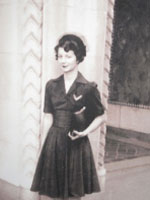 |
| Nurses training in New York City in 1942. |
| Born: 1924 |
Residence:
San Jose, CA
United States |
Original home:
Mt. Kisco, NY
United States |
When WWII ended by Japan surrendering after the atomic bond was dropped on them, I was stationed as a Cadet Nurse at an Army Hospital of 5000 patients in Atlantic City N. J. Military Hospitals were so short of staff that they commissioned students in the last half year of their nursing school training as Cadet Nurses, gave them a uniform and $65.00 a month stipend.
I was on the 7 a.m. to 3 p.m. shift and the patients, staff, everyone were alternately hugging each other, crying, laughing, phoning their families, and celebrating especially wherever there was any alcohol available.
I continued my duties that momentous day, but when I got to my room, I kneeled on my bed and thanked God for ending the war, even though I am not a particularly “church” type” of person. And then I cried off and on the rest of the day and into the evening for all those who had suffered and died through those terrible years. And then I prayed for all those we believed it necessary to kill with the atomic bomb in order to stop the war.
Underneath my sorrow was the knowledge that man possibly would continue to make atomic bombs and the thought could not help but come about that as long as atomic bombs would be available, where and when would they be used next? Feelings were very divided about whether or not we should have dropped those bombs. So far we have been lucky and none have been dropped, but there is always a lingering fear that at some time in the future that they will be used AND WE WERE THE FIRST TO USE THEM!
I would go back to New York City to pick up my R.N. diploma in September of 1945 and then returned to civilian life. I found a job located as a Charge Nurse on a Medical Floor in the Northern Westchester Hospital located in Mt. Kisco, N. Y. I lived briefly with my parents, but left in October of 1945 to pursue a degree at University Of Aurora, in Aurora, IL I earned my way by my position as the College Nurse and worked part time at a local hospital for which I was paid $8.00 a day. And it is there that I met my future husband who had just returned as a Marine from Camp Lejeune.
FLORENCE SPRAGUE |
|